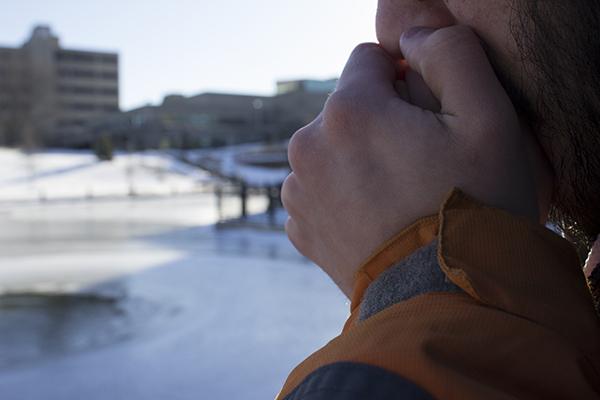NKU community withstands arctic weather

Throughout the polar blast, students found ways to handle the low temperatures on their walks across campus. “I wear a hat all the time,” Alexus Berns, a senior creative writing major, said. “My nose is constantly runny. I can’t feel my face and I feel like I don’t have a nose.”
The NKU community braved the subzero temperatures and winds that rolled throughout campus and across the Midwest this week.
“I’ve just been avoiding going outside,” said Shea Cecilia, a sophomore music major. “I almost fell outside the Student Union the other day on ice.”
The dangerously cold temperature set in at the beginning of the week, and students, faculty and staff bundled up and encountered the ice and cold blast on their commute and trek through campus.
“Commuting to campus in this freezing weather is a dread, especially with the bus,” Jamal Curry, a sophomore criminal justice major, said. “Waiting on the bus when it’s late highly annoys me. From my fingertips freezing to the wind hitting my ears, I really wish I had a car.”
Students traveling to campus by car also experienced the annoyances of the cold blast.
“I’ve been having to go outside and preheat my car 30 minutes early. I feel pretty miserable and tired,” Amanda Ewing, a junior studio arts major said.
Letting a car sit idly may actually prove to be ineffective and costly, according to Natural Resources Canada.
While college campuses in Ohio called off classes days before the extreme bouts of adverse weather conditions, some at NKU had questions concerning the procedures and determining factors beyond the decision to close campus or delay classes in the Northern Kentucky area.
President Mearns doesn’t make that decision alone, according to NKU’s Director of Marketing and Communications Chris Cole. He said that the Vice President for Administration and Finance Ken Ramey, Chief of Police Jason Willis and Assistant Vice President of Facilities and Management Larry Blake monitor weather and road conditions, and then they make a recommendation to delay or close to President Mearns.
“Our students have different needs and come from different places,” Willis said. “We can have a different on-campus population than say U.C. does or even Xavier does. Our students are commuting from different places.”
When deciding whether to delay or close, Willis said he observes more than the roads on campus and the areas surrounding campus. “We look at Campbell County, Boone County, Hamilton County. We are looking all around the area where students are going to be traveling from and looking for accidents and areas for potential accidents.”
Statewide traffic can be monitored online with cameras and road reports. For Kentucky, visit Kentucky Transportation Cabinet, and for Ohio, see BuckeyeTraffic.
Safety is always a top priority, according to Willis. The police “strategically place” themselves across campus whether or not the university is closed in order to be visual for help.
The facilities staff communicates with the police and might arrive at midnight and work throughout the night to help ensure students’ safety across campus if it is open during such potentially dangerous weather, according to Willis.
Under the Severe Weather Policy, Willis said the criteria for deciding if there will be a delay or closing includes loss of heat or electricity; extremely hazardous travel conditions — such as a level two snow emergency or a wind chill warning; or campus facilities being damaged or deemed unsafe.
Ramey, Willis and Blake begin discussing their recommendations around 4:30 a.m.. “We’re always challenged with whether the forecasts are accurate or not,” Ramey said.
In order to stay safe during extreme conditions, Willis suggests that people give themselves plenty of time, making sure their vehicles are always full of gas and keep blankets and extra clothes in your car. He also suggests not leaving any skin exposed in the cold.
So far into this semester, NKU saw delays on Jan. 6 and 28, according to Cole. NKU was also closed on Jan. 21 and 25 this year.
(Carrie Crotzer contributed to this story.)
Your donation will support the student journalists of Northern Kentucky University. Your contribution will allow us to purchase equipment and cover our annual website hosting costs.

